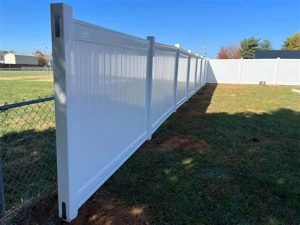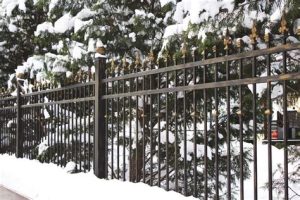Explore Florida’s fence installation regulations, licensing requirements, and the benefits of hiring licensed installers to ensure a compliant and quality installation process.If you’re considering installing a fence in Florida, you may be wondering whether you need a license for the job. Fence installation can enhance your property’s aesthetics, provide security, and increase privacy, but navigating the regulatory landscape can be tricky. In this blog post, we’ll delve into Florida’s specific fence installation regulations, outlining the licensing requirements for contractors and the process to obtain the necessary permits. We’ll also discuss the potential consequences of hiring unlicensed installers and highlight the benefits of working with licensed professionals. Whether you’re a homeowner planning a DIY project or a property owner looking to hire help, this guide will equip you with the knowledge you need to make informed decisions about your fence installation needs in the Sunshine State.
Understanding Florida’s Fence Installation Regulations
Installing a fence in Florida involves understanding the state’s specific regulations to ensure compliance and avoid potential legal issues. Florida’s local governments have their own rules and guidelines regarding fence installation, which can vary significantly by county and municipality. Before commencing any fencing project, it is crucial to familiarize yourself with these regulations.
One of the primary considerations in Florida is the height of the fence. Many areas allow fences up to six feet tall without a permit, while others may impose stricter limitations. Additionally, regulations concerning setback lines—the distance a fence must be from the property line—must also be considered. Failing to adhere to these rules can lead to costly alterations or even removal of the installed fence.
Another important factor is the type of material used for the fence. Certain areas may restrict the use of materials that do not comply with local aesthetics or environmental regulations. Therefore, researching local codes on material and design is essential to ensure that your fence not only meets structural requirements but also fits within the community’s guidelines.
Licensing Requirements for Fence Installers in Florida
When it comes to fence installation in Florida, understanding the licensing requirements is crucial for both homeowners and contractors. In Florida, the regulations set forth by the state dictate that anyone involved in the installation of fences must be appropriately licensed. This is not just a formality; it’s essential for ensuring quality and safety in construction practices.
To become a licensed fence installer in Florida, an applicant must meet specific criteria. Typically, this includes completing a certain number of practical hours in the field, passing a licensing exam, and providing proof of liability insurance. Additionally, some counties may have their own regulations, which can vary significantly from state requirements. Therefore, it’s vital to check with local authorities for any additional stipulations.
Hiring licensed fence installers also offers benefits to homeowners. Licensed professionals are often more knowledgeable about local codes and regulations, which can save property owners from potential legal issues. Moreover, they usually have the experience and skills necessary to complete the job efficiently and safely, ensuring that your fence is installed correctly and will last for years to come.
Process for Obtaining a Fence Installation License
When considering a career in fence installation in Florida, understanding the process for obtaining a fence installation license is essential. The licensing process may vary by county but generally includes several key steps that ensure compliance with local regulations.
First, aspiring fence installers need to complete the required training. This may involve both classroom instruction and hands-on experience. Many counties require applicants to complete a specific number of hours in a training program focused on safety, installation techniques, and local building codes.
Next, applicants must pass a licensing exam. The exam typically covers various topics including Florida’s building codes, zoning laws, and safe installation practices. Additionally, prospective fence installers are encouraged to gather documentation regarding their work experience, as this can greatly assist in the licensing process.
Following successful completion of the training and exam, individuals must submit an application to the appropriate county office. This application usually requires proof of insurance, a background check, and the payment of any associated fees. It’s crucial to ensure that all submitted documentation is accurate and complete to avoid delays in receiving the license.
Impact of Unlicensed Fence Installation in Florida
In Florida, the trend of engaging in unlicensed fence installation has been a growing concern for both homeowners and regulatory authorities. Many property owners, enticed by lower costs, often overlook the significant risks associated with hiring unlicensed contractors.
One of the most immediate impacts of unlicensed fence installation is the lack of accountability. When a fence installer is not licensed, there is little recourse for homeowners in case of poor workmanship or failure to adhere to local building codes. This can lead to faulty installations that may require costly repairs in the future, offsetting any initial savings.
Moreover, unlicensed installations can have serious legal ramifications. If a fence is installed without a permit or doesn’t comply with local zoning laws, homeowners may face fines or be required to remove the fence altogether. This not only leads to financial loss but can also cause considerable stress and inconvenience.
Engaging unlicensed contractors may also jeopardize liability coverage. If an accident occurs during the installation or if the fence causes damage to neighboring properties, homeowners may find themselves liable since unlicensed contractors often do not carry appropriate insurance. Ultimately, while the allure of saving money may seem appealing, the risks associated with unlicensed fence installation in Florida can far outweigh the benefits.
Benefits of Hiring Licensed Fence Installers
When it comes to installing a fence, many homeowners may wonder if they can save money by hiring an unlicensed contractor or doing it themselves. However, hiring licensed fence installers offers numerous advantages that can save you time, money, and stress in the long run.
One of the key benefits of hiring licensed fence installers is that they have undergone rigorous training and obtained the necessary certifications to perform their work. This means they are skilled in the latest techniques and local building codes, ensuring that your fence is installed correctly and safely.
Additionally, licensed fence installers usually carry insurance, protecting you from liability in case of accidents during the installation process. This peace of mind is invaluable, especially when it comes to larger projects that may pose risks. In summary, investing in licensed professionals for your fence installation can lead to better quality, compliance with regulations, and overall satisfaction with the results.
Frequently Asked Questions
Is a license required to install fences in Florida?
Generally, a license is not required for homeowners to install their own fences, but contractors typically need a specific license depending on the local regulations.
What types of fences can be installed without a license?
Homeowners can usually install decorative or boundary fences up to a certain height without a license, but larger or more complex structures may require one.
Are there any permits required for fence installation in Florida?
Yes, most municipalities require a permit before installing a fence, especially if it exceeds certain height limits or is in a specific zoning area.
What should I check before installing a fence on my property?
Before installing a fence, you should check local zoning laws, property lines, and if any homeowner association rules apply.
Can I install a fence if there are utility lines buried in my yard?
You should always check for underground utility lines before installing a fence. In Florida, you can call 811 to have these lines marked.
What are the penalties for installing a fence without a permit in Florida?
Installing a fence without a permit can result in fines, removal orders, or other legal repercussions enforced by local authorities.
How can I find out more about local fence installation regulations?
You can contact your local building department or visit their website to learn more about specific regulations and requirements for fence installations.





